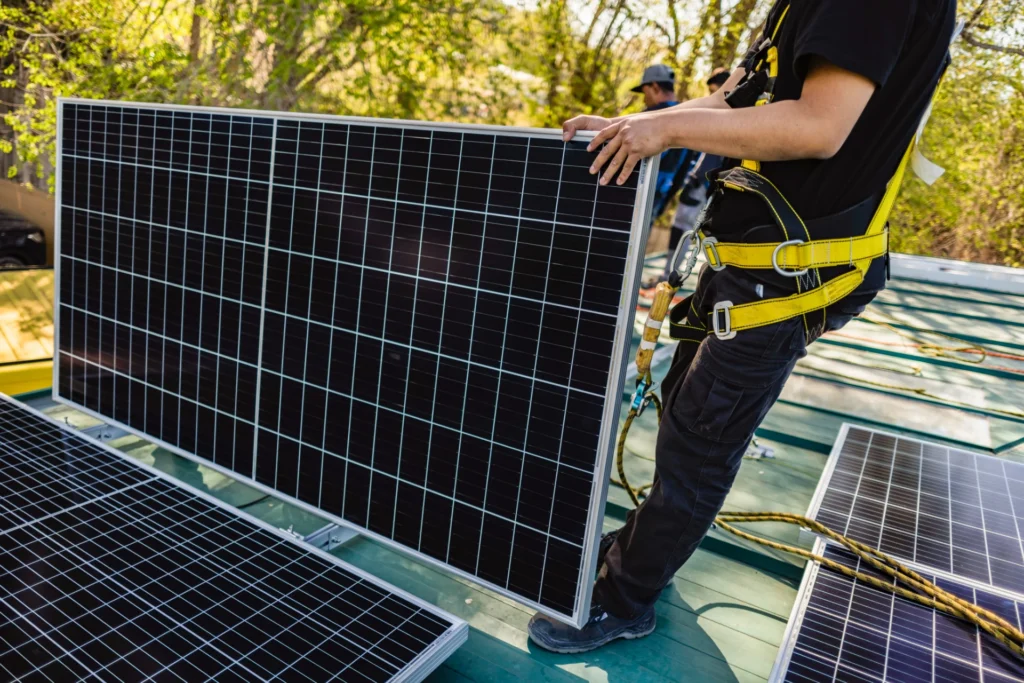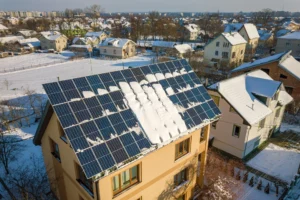
Solar energy is an increasingly popular renewable source for homeowners and businesses. Solar panels have become a common way to harness the sun’s power and generate electricity. However, with so many different brands and models available on the market, it can be challenging to accurately compare their performance and efficiency. This article will explore how to evaluate various solar panel brands and models effectively.
To choose the right solar panel brand and model, it is essential first to understand your energy needs. Once you know how much power you require, you can begin evaluating factors such as efficiency, durability, cost, and warranties offered by manufacturers or installers – all crucial considerations in making informed decisions about which solar panel system may best meet your needs. This article will provide detailed guidance on what to look for when comparing different solar panels’ performance and efficiency so that you can make an informed decision that suits your unique requirements while also helping reduce our dependence on non-renewable resources.
The initial step in determining the optimal solar panel for a given situation is accurately assessing one’s energy requirements. This means considering factors such as the size of the home or business, how many appliances and devices will be powered by solar energy, and what time of day these devices are typically used. It is important to be as precise as possible when calculating energy needs so that the correct size and number of panels can be selected.
Once energy requirements have been determined, it is important to research different solar panel brands and models to determine which will best meet those needs. This involves looking at efficiency ratings, warranty periods, durability, and cost specifications. Reading reviews from other customers who have purchased similar systems can also provide valuable insight into which brands and models are most reliable.
Another consideration when comparing different solar panel brands and models is their compatibility with other system components, such as inverters and batteries. Some panels may work better with certain types of inverters or batteries, while others may not be compatible at all. Ensuring that all system components work together seamlessly to maximize efficiency is important.
Ultimately, selecting the right solar panel brand and model requires thorough research and careful consideration of multiple factors beyond price or efficiency ratings alone. By considering individual energy needs, researching different options thoroughly, and considering compatibility with other system components, consumers can select a high-quality system that meets their needs while providing long-term savings on electricity costs.
Assessing the efficacy of solar panels necessitates an in-depth analysis of their capacity to convert sunlight into electricity. One important factor to consider is power output, which refers to the electricity produced by a solar panel under specific conditions. Power output can be measured in watts (W) or kilowatts (kW). The higher the power output, the more energy a panel can produce. However, it’s important to note that power output varies depending on weather conditions and the angle and direction of sunlight hitting the panel.
Another crucial factor to evaluate when comparing solar panels is the efficiency rating. Efficiency measures how well a panel converts sunlight into usable electricity. It’s calculated by dividing the panel’s power output by its surface area in square meters. The higher the efficiency rating, the more energy a panel can produce, given a certain amount of sunlight exposure. As with power output, efficiency can also vary based on environmental factors.
To determine which solar panels will work most efficiently for your needs, it’s essential to compare multiple brands and models using standardized metrics such as power output and efficiency ratings. In addition, you may want to consider other factors, such as durability and warranty options, when deciding.
Overall, evaluating the efficiency of different solar panels requires careful consideration of multiple factors that impact their ability to convert sunlight into electrical energy. By carefully analyzing these metrics and considering your unique energy needs, you can decide which brand and model will best meet your requirements while providing optimal performance over time.
When selecting solar panels, it is important to consider the product’s durability to ensure long-lasting and reliable performance. Durability refers to the ability of a solar panel to withstand various environmental factors such as extreme temperatures, hailstorms, high winds, and heavy snow loads. It is essential that the solar panel can resist these conditions without any damage or significant reduction in efficiency. A durable solar panel will also require less maintenance over time than a less durable one.
One way to evaluate a solar panel’s durability is by examining its materials and construction quality. High-quality materials such as tempered glass, anti-reflective coating, and sturdy aluminum frames are indicators of good durability. Additionally, advanced manufacturing techniques like soldering instead of clips or adhesives can improve the longevity of a solar panel by reducing potential weak points that could lead to failure over time.
Another aspect that influences durability is warranty coverage offered by manufacturers. While most warranties cover defects in materials or workmanship for 10-25 years, some manufacturers offer extended warranties for up to 30 years or more on their products’ performance. These longer warranties may give consumers peace of mind regarding their investment’s long-term protection against potential issues.
Finally, it’s worth noting that durability depends not solely on brand or model but also on installation practices. Consumers should hire reputable installers who follow proper procedures and regulations when installing their panels. They should also consider geographical location when selecting panels since different regions have unique weather conditions affecting each model differently.
In conclusion, considering durability when choosing solar panels is critical for ensuring long-lasting performance and reliability while minimizing maintenance costs. Examining materials and construction quality along with warranty coverage are useful strategies for evaluating durability during purchase decisions alongside hiring professionals with proper installation experience addition to accounting for regional factors impacting different models’ performances differently over time will aid consumers in making informed choices about which models best suit specific needs while ensuring maximum return on investment.
Evaluating the cost of solar panels is important in determining the feasibility and financial benefits of implementing a solar energy system. Solar panels come in different brands, models, and sizes, making it challenging to compare their costs directly. Therefore, it is crucial to evaluate various factors that influence the cost of solar panels. These factors include:
It is also essential to consider different pricing structures when evaluating the cost of solar panels. Some companies may offer financing options, such as leasing or power purchase agreements (PPAs), which can significantly reduce upfront costs but may result in higher overall expenses over time.
When comparing different brands and models of solar panels, it is critical to focus on prices and long-term value. A high-quality panel with excellent performance may have a higher price tag upfront. Still, it can save significant energy bills over time compared to a lower-cost panel with poor efficiency or durability.
In conclusion, evaluating the cost of solar panels involves considering several factors beyond just prices. By considering panel efficiency, material quality, installation costs, warranty terms, and pricing structures offered by manufacturers, homeowners can make informed decisions when choosing different brands and models available in today’s market.
Examining warranties offered by manufacturers is a crucial step in determining the overall value and reliability of solar panel options. It is important to check what type of warranty is being offered and its duration and coverage. For instance, some companies may offer a power output warranty that guarantees that the panel will produce a certain amount of electricity for a specific number of years. Others may provide workmanship warranties that cover defects or issues caused during installation.
To help make an informed decision when comparing solar panels, creating a table that outlines each manufacturer’s warranty details can be useful. Here is an example:
Manufacturer | Power Output Warranty | Workmanship Warranty | Duration |
|
|
|
|
Brand A | 25 years at 80% efficiency | 10 years repair/replacement costs covered by the manufacturer | 25 years |
Brand B | 25 years at 85% efficiency | 5 years repair/replacement costs covered by installer or owner; after year 5, costs covered by the manufacturer up to $X per incident* (see note below) | 25 years |
Brand C | No power output warranty | Cover defects for the first year only | 10 Years |
This table can help you quickly see how different brands stack up against each other regarding their warranties and give you an idea about which ones might be more reliable over time.
In addition to checking the type and length of warranties offered, it is also important to read the fine print carefully. Some manufacturers may have exclusions or limitations on their coverage that could impact your decision-making process. By considering all these factors, you can better evaluate which solar panel brands and models are worth investing in based on their performance and efficiency over time.
*Note: this column should include any relevant dollar amounts for clarity, such as the initial cost of the solar panels, potential savings on energy bills, and any additional costs for maintenance or repairs. It is important to consider the long-term return on investment for each brand and model of solar panel to determine which one is the most cost-effective option for your specific needs and budget.
To further evaluate the performance and efficiency of different solar panel brands and models, it is essential to consider the manufacturer’s reputation. A company’s reputation can indicate its commitment to quality, innovation, and ability to meet customer needs. This information can be obtained through research on industry publications, online reviews, or by contacting the manufacturer directly.
The reputation of a solar panel manufacturer is often tied to its history in the industry. Established companies with a long history of producing high-quality panels are generally a safer bet than newer entrants into the market. Researching their achievements in developing new technology or pushing for sustainability initiatives can also provide insight into their reputation.
Another factor contributing to a company’s reputation is its track record in providing effective customer support services. Companies prioritizing customer satisfaction by providing responsive service and warranties covering defects or malfunctions are more likely to have satisfied customers who would recommend them over others.
It should be noted that while considering a company’s reputation is important, it should not be used as the sole criterion for choosing solar panels. Other factors such as cost, efficiency rates, and energy output should also be considered when purchasing decisions.
In summary, understanding how reputable a solar panel manufacturer is can help consumers decide which brand or model to choose from. Researching these companies’ backgrounds, technological advancements, sustainability initiatives, and customer service policies before making any purchases will ensure you invest in high-quality products that will serve you well over time.
Assessing the experience and reputation of the installer is an important aspect to consider when seeking a reliable and proficient solar panel installation service. An experienced and reputable installer can guarantee quality workmanship, ensuring your solar panels are installed correctly and efficiently. To find a good installer, here are three things to consider:
Overall, choosing an experienced and reputable solar panel installer is crucial in ensuring the efficiency of your system over its lifespan while avoiding costly mistakes during installation or maintenance procedures later on down the line. By following these steps described above in evaluating installers’ experiences/reputations – looking for certification(s), checking references from prior clients/work done by them locally or regionally – you’ll have greater peace of mind knowing that your solar investment is in good hands without any worry about future issues arising due to poor-quality workmanship or lack thereof!
Considering the visual impact of solar panels on a building’s facade and roof is important when choosing a solar panel installation, as it can affect the overall aesthetic value and property resale potential. While some people may prioritize efficiency over aesthetics, it is worth noting that modern solar panels come in various designs, colors, and sizes to fit different architectural styles and preferences.
In addition to choosing the right color and design for the panels, homeowners should also consider their placement on the roof. Ideally, solar panels should be installed to minimize their visibility from street level while maximizing their exposure to sunlight. This can involve strategic positioning on certain roof parts or using angled mounts to tilt them toward the sun.
Another factor to consider is whether or not your local authorities have any regulations regarding solar panel installations. Some cities or neighborhoods might have restrictions on where they can be placed or what they look like. It’s important to research these regulations beforehand to avoid any legal issues down the line.
Ultimately, balancing aesthetics with efficiency comes down to personal preference and priorities. However, by considering all of these factors when considering different brands and models of solar panels, homeowners can make informed decisions that will benefit their wallets and their homes’ appearance.
Informed decision-making is crucial when considering the installation of solar panels, as it can have a significant impact on both the aesthetic value and efficiency of a building. Making an informed decision requires carefully assessing different solar panel brands and models to determine which will best meet your needs. Here are some tips to help you make an informed decision:
It’s important to remember that many factors affect the performance and efficiency of solar panels beyond just brand and model. The location of your building, shading from nearby trees or buildings, weather patterns in your area, and other factors can all impact how much electricity your solar panels generate over time. That said, comparing different brands and models can give you a good starting point for deciding what type of solar panels will work best for you.
Ultimately, choosing the right brand and model of solar panels requires careful consideration of multiple factors. In addition to comparing efficiency ratings and warranties among different manufacturers, it may also be helpful to consult with experts in the field who can provide additional guidance based on your specific needs and circumstances. With so many options available on the market today, taking the time to research different brands and models thoroughly before making a purchase is key to ensuring that you get maximum value from your investment in renewable energy technology.
In conclusion, evaluating the performance and efficiency of different solar panel brands and models requires a thorough analysis of various factors. Firstly, it is vital to understand your energy needs before selecting a solar panel that meets those requirements. Secondly, assessing the efficiency and durability of solar panels is crucial as these factors impact their longevity and overall effectiveness.
Thirdly, pricing plays a significant role in determining the value for money different solar panels offer. Additionally, checking warranties provided by manufacturers ensures you are protected against defects or damages during the panel’s lifespan. Moreover, considering the reputation of the manufacturer and installer can provide valuable insights into their reliability and credibility.
Lastly, aesthetics can be essential for homeowners who prioritize visual appeal for their homes. By considering all these factors, one can make an informed decision while choosing from various solar panel brands and models available in the market. Ultimately, making such choices will not only facilitate sustainable energy consumption but also contribute towards reducing the carbon footprint on our planet.
Solar panels typically last 25-30 years, with some high-end models lasting up to 40 years. Solar panels’ longevity largely depends on the quality of materials used in their construction, as well as the maintenance and care they receive over time. Factors that can impact the lifespan of solar panels include exposure to extreme weather conditions, such as hail or heavy snowfall, and regular cleaning to remove dirt and debris that can accumulate on the surface of the panels. Regular inspections by a qualified professional can also help identify any issues with a solar panel system early on, allowing for timely repairs and maintenance to prevent more significant problems from developing later on. Investing in high-quality solar panels from reputable manufacturers is key to ensuring optimal performance and longevity over time.
When it comes to solar panels, there are two main types: monocrystalline and polycrystalline. Monocrystalline solar panels are made from a single silicon crystal and have a higher efficiency rate than polycrystalline panels made from multiple crystals. However, monocrystalline panels are also more expensive. Polycrystalline panels have lower efficiency but tend to be more cost-effective. It’s important to note that its type or brand does not just determine the performance of a solar panel; factors such as location, shading, and weather conditions all play a role in determining overall efficiency and output. When comparing different brands and models of solar panels, it’s important to look at their efficiency ratings, warranties, and customer reviews to make an informed decision.
When installing solar panels, it is important to consider the complexity and safety concerns involved in the process. While some individuals may have the necessary skills and knowledge to install solar panels themselves, it is generally recommended that a professional installer be hired. This is because solar panel installation involves working with electrical systems and requires specific expertise to ensure everything is properly installed and functioning safely. Hiring a professional installer often comes with warranties and guarantees that can provide peace of mind for homeowners. Ultimately, while DIY installation may seem attractive for those looking to save money, it is important to weigh the risks and benefits before deciding.
The installation of solar panels has become increasingly popular in recent years due to its potential for cost savings and environmental benefits. Government incentives and tax credits are available for those who install solar panels, providing a financial incentive that may offset the initial investment costs. For example, the federal government offers a Residential Renewable Energy Tax Credit, which provides a credit of up to 26% of the total cost of the solar panel system. Additionally, many states offer incentives, such as rebates or sales tax exemptions. These incentives can vary based on location and other factors, so it is important to research what options are available in your area.
Weather conditions such as rain, snow, and hail can impact the performance of solar panels. Rain can help clean off any dust or debris on the panels, which may improve their efficiency. However, heavy rain or flooding could damage the panels if they are not installed properly or do not have adequate drainage systems. Snow can also affect solar panel performance by covering them and reducing their exposure to sunlight. Hail can cause physical damage to the panels if it is large enough and hits them with enough force. Therefore, it is important for individuals considering installing solar panels to carefully consider their local weather conditions and ensure that their installation is designed to withstand potential weather-related impacts.

How much Electricity does Solar generate in Winter Months? Share: Facebook Twitter LinkedIn Pinterest How much Electricity does Solar generate in Winter ? Solar energy

How Does The Efficiency Of Solar Panels Change Over Time? Share: Facebook Twitter LinkedIn Pinterest Solar energy has become an increasingly popular renewable energy source

Can I Use Solar Power For Heating And Cooling My Home? Share: Facebook Twitter LinkedIn Pinterest Solar power has become an increasingly popular alternative to

Will I Still Have Electricity During A Power Outage If I Have Solar Panels? Share: Facebook Twitter LinkedIn Pinterest During natural disasters or other emergency

Efficiency Of Residential Solar Systems Share: Facebook Twitter LinkedIn Pinterest Residential solar systems have become increasingly popular as homeowners look for ways to generate their